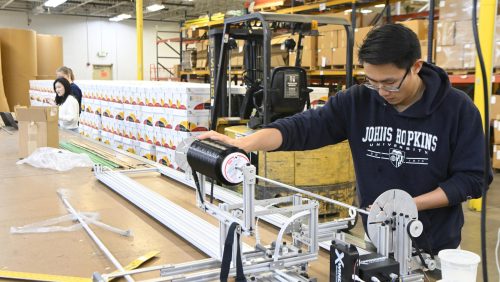Why Choose Hopkins?
Five Reasons to Earn the B.S. Mechanical Engineering degree or the B.S. Engineering Mechanics degree at Johns Hopkins:
- You will study under world-class researchers who love to teach and mentor young people in the theoretical and practical aspects of mechanical engineering.
- You will be more than a number. You will be mentored as an individual and guided into areas that suit your own unique skills.
- You will be immersed in a hands-on curriculum starting your first semester.
- You will be given flexibility to pursue your own interests through independent research, clubs, and double majors and minors.
- You will gain real-world experience in our Senior Design Project course sponsored by nonprofits, research organizations, and industry.
Visit our Undergraduate Majors and Tracks page to learn more about the unique attributes of these degree programs, where the B.S. Mechanical Engineering degree emphasizes professional preparation as a mechanical engineer and the B.S. Engineering Mechanics degree offers additional flexibility in technical and engineering elective options while retaining fundamental required core engineering courses.
Accreditation, Program Objectives, and Student Outcomes
The BS in the Mechanical Engineering degree program is accredited by the Engineering Accreditation Commission of ABET, https://www.abet.org, under the General Criteria and the Program Criteria for Mechanical and Similarly Named Engineering programs.
The BS in the Engineering Mechanics degree program is accredited by the Engineering Accreditation Commission of ABET, https://www.abet.org, under the General Criteria and the Program Criteria for Engineering Mechanics and Similarly Named Engineering programs.
Additional information from the Whiting School of Engineering regarding our ABET Accreditation can be found here.
Program Educational Objectives
Our primary objective is to educate an exceptional group of engineers who, after graduation, will be successful and on track to become leaders among their peers
- in the best graduate programs and / or
- in industry, government laboratories, academia, and other organizations.
Student Outcomes
Students graduating with a B.S. in Mechanical Engineering will have demonstrated:
- An ability to identify, formulate, and solve complex engineering problems by applying principles of engineering, science, and mathematics
- An ability to apply engineering design to produce solutions that meet specified needs with consideration of public health, safety, and welfare, as well as global, cultural, social, environmental, and economic factors
- An ability to communicate effectively with a range of audiences
- An ability to recognize ethical and professional responsibilities in engineering situations and make informed judgments, which must consider the impact of engineering solutions in global, economic, environmental, and societal contexts
- An ability to function effectively on a team whose members together provide leadership, create a collaborative and inclusive environment, establish goals, plan tasks, and meet objectives
- An ability to develop and conduct appropriate experimentation, analyze and interpret data, and use engineering judgment to draw conclusions
- An ability to acquire and apply new knowledge as needed, using appropriate learning strategies.
Enrollments and Graduates
The enrollment numbers may fluctuate slightly during the year. Note that “Total Enrollment” includes all freshmen, sophomores, juniors, and seniors enrolled that year. “BS Degrees Awarded” include all within the total enrollment who graduated or are expected to graduate. This page is updated periodically.
Program Educational Objectives
Our primary objective is to educate an exceptional group of engineers who, after graduation, will be successful and on track to become leaders among their peers
- in the best graduate programs and / or
- in industry, government laboratories, academia, and other organizations.
Student Outcomes
Students graduating with a B.S. in Engineering Mechanics will have demonstrated:
- An ability to identify, formulate, and solve complex engineering problems by applying principles of engineering, science, and mathematics
- An ability to apply engineering design to produce solutions that meet specified needs with consideration of public health, safety, and welfare, as well as global, cultural, social, environmental, and economic factors
- An ability to communicate effectively with a range of audiences
- An ability to recognize ethical and professional responsibilities in engineering situations and make informed judgments, which must consider the impact of engineering solutions in global, economic, environmental, and societal contexts
- An ability to function effectively on a team whose members together provide leadership, create a collaborative and inclusive environment, establish goals, plan tasks, and meet objectives
- An ability to develop and conduct appropriate experimentation, analyze and interpret data, and use engineering judgment to draw conclusions
- An ability to acquire and apply new knowledge as needed, using appropriate learning strategies.
Enrollments and Graduates
The enrollment numbers may fluctuate slightly during the year. Note that “Total Enrollment” includes all freshmen, sophomores, juniors, and seniors enrolled that year. “BS Degrees Awarded” include all within the total enrollment who graduated or are expected to graduate. This page is updated periodically.
